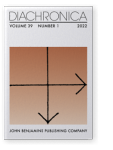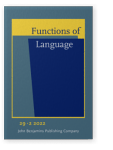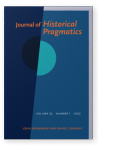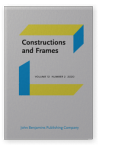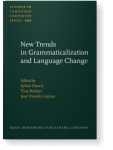Yueh Hsin Kuo
List of John Benjamins publications for which Yueh Hsin Kuo plays a role.
2022 Bidirectionality between modal and conditional constructions in Mandarin Chinese: A constructionalization account Diachronica 39:1, pp. 88–127 | Article
This paper proposes that modal constructions can develop into conditional constructions in Mandarin Chinese and vice versa. Therefore, bidirectionality exists between these kinds of constructions diachronically. While bidirectionality is an apparent violation of unidirectionality, both directions… read more
2022 From dynamic modal to conditional protasis connective: Evidence from Chinese néng ‘be able to’ Functions of Language 29:2, pp. 143–168 | Article
The grammaticalization literature has not demonstrated convincingly how, if at all, dynamic modals may develop into conditional protasis connectives. Drawing on qualitative and quantitative evidence from Chinese, this paper hypothesizes that such a directionality may arise through univerbation… read more
2022 From deontic modality to conditionality: A diachronic investigation into bì in Classical Chinese Journal of Historical Pragmatics 23:1, pp. 84–110 | Article
While epistemic modality has been suggested to be a modal source of conditionality, deontic modality has been generally overlooked. Using data from Classical Chinese and the Invited Inferencing Theory of Semantic Change, this study demonstrates that the deontic modal bi tends to invite… read more
2021 A constructional account of the loss of the adverse avertive schema in Mandarin Chinese Lost in Change: Causes and processes in the loss of grammatical elements and constructions, Kranich, Svenja and Tine Breban (eds.), pp. 131–158 | Chapter
This study defines the kind of loss under investigation as schema loss in diachronic construction grammar and proposes that schema loss may be related to change in prototypicality. Using the adverse avertive schema in Chinese as an example, it is shown that while older prototypical members of the… read more
2020 Reinforcement by realignment in diachronic construction grammar: The case of classifier xiē in Mandarin Chinese Constructions and Frames 12:2, pp. 206–238 | Article
This paper suggests that xiē ‘some’ in Mandarin Chinese originated as a quantifier but became a classifier in the yi ‘one’ construction via realignment, or change in inheritance in diachronic construction grammar. This change has created yi xiē, semantically equivalent to xiē, therefore it is… read more
2018 The development of three classifiers into degree modifier constructions in Chinese New Trends in Grammaticalization and Language Change, Hancil, Sylvie, Tine Breban and José Vicente Lozano (eds.), pp. 315–331 | Chapter
This paper is a constructionalisation case study on how a post-head degree modifying (sub)schema arose, which generalises over three constructions that are classifiers in origin: yi xie ‘some’, yi dian ‘one bit’, and yi xia ‘one downward motion’. Two factors underlie their developments:… read more
